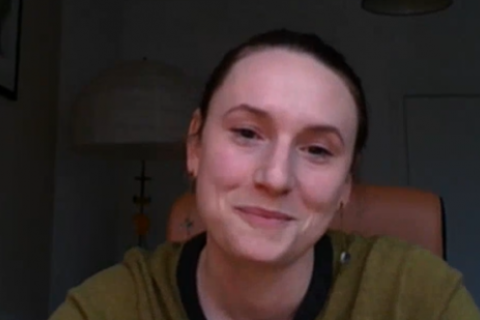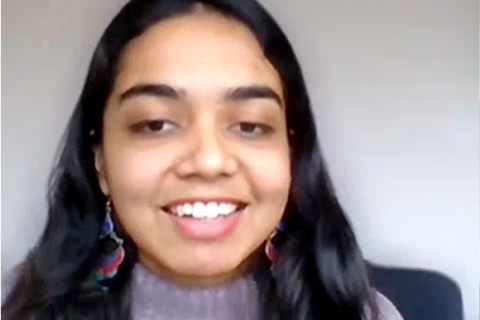Louisa Niesen and Rashmi Shetty are the winners of the 2021 thesis award!
During the online New Year's meeting on January 10, the winners of the annual faculty thesis award were announced: Louisa Niesen (MA Cultural History) and Rashmi Shetty (RMA Religious Studies) received a certificate and €500 and were interviewed by Annemarie Kalis.
In the video above you can see an interview with the winners and Leen Dorsman, Professor of University History, takes you through the Academy Building.
Louisa Niesen

Modern Women? On Practices and Experiences of ‘Modernity’ in the Everyday Lives of Female White-Collar Employees in the Weimar Republic.
Louisa Niesen wrote her thesis for the MA Cultural History and was supervised by Jochen Hung. The thesis tests the hypothesis that German women immediately after World War I were "modern" in their lifestyle and therefore fundamentally different from their more traditional mothers. A particularly strong aspect of this thesis is its innovative focus on women's behavior as reported in private documents, rather than prescriptive documents that told women how to behave, as other historical studies have done. In her conclusions, the author convincingly demonstrates that the contrast between traditional and modern lifestyles was much less visible in the lived experiences of women, and that World War I therefore did not represent as sharp a dividing line as had been assumed by previous historians. The jury also appreciated the clear structure, strong writing style, and balanced conclusions of this thesis.
In addition to the thesis prize, Louisa also won the Hugo-Preuß-Preis of the Forschungsstelle Weimarer Republik at the University of Jena. This prize is awarded to the best master's thesis on the history of the Weimar Republic, written in Germany or abroad.
Rashmi Shetty

Digitally Mediated Neo-Hindutva Affective Economies and Publics.
Rashmi Shetty has written her thesis for the RMA Religious Studies, supervised by Pooyan Tamimi Arab. This thesis looks at how a radical Hindu group in India uses social media, using stereotypes to evoke emotions. The media content is framed by an analysis of the penetration of social media platforms in Indian society, revealing how a group that claims to defend traditional Hindu values gets away with mobilizing the latest communication technologies. This analysis shows that the social media content of this particular group has little to do with religious beliefs but more to do with emotions. The thesis therefore suggests that these emotional aspects of social media content should be given a much greater place in our understanding of their effects, both politically and in a religious context. The jury was impressed by the originality of the approach, the interdisciplinarity of this research project, and the in-depth analysis of media content. Rashmi was able to study thanks to the Friends of the Humanities Utrecht University Fund which allows excellent students like Rashmi to obtain such greats achievements.

